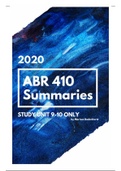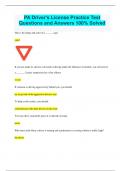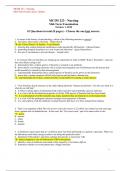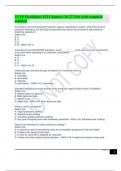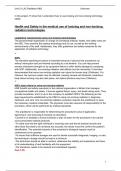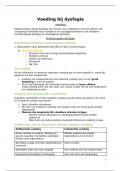Page 2 of 98
,ABR 410 Marissa Badenhorst
STUDY UNIT 9: COLLECTIVE
BARGAINING, STRIKES AND LOCK-
OUTS
CHAPTER 15 AND 16
Compulsory study material
1. Van Niekerk and Smit Law@work (2019) Chapter 15 and 16
2. Association of Mineworkers & Construction Union v Chamber of Mines (2017) 38 ILJ 831 (CC)
3. Van Eck “In the Name of ‘Workplace and Majoritarianism’: Though Shalt not Strike ― Association of
Mineworkers & Construction Union v Chamber of Mines (2017) 38 ILJ 831 (CC) and National Union of
Metalworkers of SA & Others v Bader Bop (Pty) Ltd & Another (2003) 24 ILJ 305 (CC)” 2017 ILJ 1496-
1510
4. Modise & others v Steve’s Spar Blackheath (2000) 21 ILJ 519 (LAC)
5. NUM & others v Billard Contractors CC & another (2006) 27 ILJ 1686 (LC)
6. SA Transport & Allied Workers Union & Another v Garvas & Others 2012 33 ILJ 1593 (CC)
INTRODUCTION
• One of the main purposes of the LRA is to promote orderly collective bargaining at
sectoral level
• Definition of collective bargaining:
•Collective bargaining is a process in which workers
and employers make claims upon each other and
resolve them through a process of negotiation
leading to collective agreements that are mutually
beneficial. In the process, different interests are
reconciled. For workers, joining together allows them
Definition of to have a more balanced relationship with their
collective employer. It also provides a mechanism for
bargaining negotiating a fair share of the results of their work,
with due respect for the financial position of the
enterprise or public service in which they are
employed. For employers, free association enables
firms to ensure that competition is constructive, fair
and based on a collaborative effort to raise
productivity and conditions of work.
• Collective bargaining, as a social institution, is necessarily responsive to economic
demands and circumstances
• The LRA does not compel collective bargaining and the courts have no role in
determining whether an employer should bargain collectively with a trade union, what
Page 3 of 98
,ABR 410 Marissa Badenhorst
they should bargain about, at which level they should bargain or how parties to a
negotiation should conduct themselves
o The SCA has said that “The LRA emphasises the virtues of collective bargaining
but nowhere suggests that the process
should be other than voluntary”
o The drafters of the LRA deliberately
excluded any mention of a duty to bargain
from the definition of ‘unfair labour
practices’
o There is a direct preference for a system that
does not rely on a legally enforceable right
to bargain
o The Constitution, while recognising and
protecting the central role of collective
bargaining in our labour dispensation, does
not impose on employers or employees a judicially enforceable duty to
bargain
o The LRA remains facilitative rather than prescriptive while promoting collective
bargaining as the primary mechanism to establish terms and conditions of
employment and void industrial conflict
BARGAINING PARTIES – TRADE UNIONS, EMPLOYERS AND EMPLOYERS’
ORGANISATIONS
INTRODUCTION
Definition of Trade Union an association of employees whose principal purpose is to
(section 213 of the LRA) regulate relations between employees and employers,
including any employers’ organisations
Definition of employers’ any number of employers associated together for the
organisation purpose, whether by itself or with other purpose, of regulating
(section 213 of the LRA) relations between employers and employees or trade unions
NB to know the definitions of ‘trade union’ and ‘employers’ organisation’
• The purpose of regulating trade unions and employer organisations ≠ to interfere with
their right to formulate and conduct their own programmes → rather to promote the
interests of third parties
REGISTRATION
• The LRA establishes a simple registration procedure for trade unions and employers’
organisations and is similar to that which applies to close corporations and companies
o The registrar no longer has a wide discretion to refuse registration and the
process if directed primarily to ensure democratic practices, financial
accountability, independence and non-discrimination within employers’
organisations and trade unions
• What is the effect of registration?
o Section 97(1) of the LRA provides that a certificate of registration is sufficient
proof that a registered trade union or registered employers’ organisation is a
body corporate
Page 4 of 98
,ABR 410 Marissa Badenhorst
▪ By reason of its status as a body corporate, a trade union or employers’
organisation may, inter alia:
• Sue or be sued in its own name
• Acquire property and dispose of property
• Conclude agreements
▪ Ito section 97(2) of the LRA, the fact that a person is a member of a
registered trade union or a registered employers’ organisation ≠ make
that person liable for any of the obligations or liabilities of the trade
union or employers’ organisation
▪ Section 97(3) of the LRA provides that a member, office-bearer or official
of a registered trade union or a registered employers’ organisation or a
trade union representative ≠ personally liable for any loss suffered by
any person as a result of an act performed or omitted in good faith by
the member, office-bearer, official or trade union representative while
performing their function for or obo the trade union or employers’
organisation
o A registered union becomes entitled to:
▪ Conclude collective agreements as defined in section 213 of the LRA
▪ Participate in the establishment of a bargaining and statutory council
and the right to become parties to such a council
▪ Participate in the establishment of a workplace forum (where the union
is a majority union)
▪ Represent members in dispute resolution proceedings under the LRA
and
▪ Qualify for statutory organisational rights (provided that the union is
representative)
BALLOTS ABOUT STRIKES OR LOCK-OUTS ( NB)
• There ≠ requirement for a secret ballot prior to a strike or lock-out → section 95(5)(p) of
the LRA provides that a trade union or employers’ organisation must conduct a ballot
of those of its members iro whom it intends to call the strike or lock-out before calling a
strike or lock-out
o However, section 67(7) of the LRA provides that the failure of a registered trade
union or a registered employers’ organisation to comply with the provision in its
constitution requiring it to conduct a ballot of those of its members iro whom it
intends to call a strike or lock-out, may not give rise to or constitute a ground for
any litigation that will affect the legality of the strike or lock-out
o Members of the trade union or employers’ organisation may not be disciplined
or have their membership terminated if they fail or refuse to participate in any
strike or lock-out if:
▪ No ballot was held about the strike or lock-out; or
▪ A ballot was held but a majority of the members who voted did not vote
in favour of the strike or lock-out
o ∴ the constitution must require a strike ballot, however, it does not affect
whether it is a protected strike or not
BARGAINING COUNCILS
Page 5 of 98
,ABR 410 Marissa Badenhorst
INTRODUCTION
• One of the purposes of the LRA is to promote collective bargaining ‘at sectorial level’
→ the primary vehicle to achieve this purpose is the bargaining council
o What are bargaining councils? ( NB to know definition of ‘bargaining council’)
▪ Bargaining councils are voluntary bodies, established by registered
trade unions and registered employers’ organisations that have
achieved a threshold of representivity in a defined sector
o What is the main function of a bargaining council?
▪ To serve as a forum for the negotiation of terms and conditions of
employment of the members of the union parties to the council, and for
all employees engaged in the sector
•Bargaining councils are voluntary bodies,
Definition of establsihed by registered trade unions and
'bargaining registered employers' organisations that
councils' have achieved a threshold of representivity
in a defined sector
•To serve as a forum for the negotiation of
Main function
terms and conditions of employment of the
of a
members of the union parties to the
bargaining
council, and sometimes for all employees
council
engaged in the sector
PARTIES TO A BARGAINING COUNCIL
• Ito section 27(1) of the LRA, one or more registered trade unions and one or more
registered employers’ organisations may establish a bargaining council for a sector
and area by
o Adopting a constitution that meets the requirements of section 30; and
o Obtaining registration of the bargaining council in terms of section 29
• A bargaining council may be established for more than one sector
• Section 27(2) of the LRA provides that the state may be a party to any bargaining
council if it is an employer in the sector and area iro which the bargaining council is
established
One/more
One/more
registered Bargaining
registered
employers' Council
trade union
organisation
Page 6 of 98
,ABR 410 Marissa Badenhorst
POWERS AND FUNCTIONS OF A BARGAINING COUNCIL
• Ito section 28 of the LRA, the primary powers and functions of a bargaining council are
to: ( NB)
o Conclude and enforce collective agreements NEDLAC:
o Prevent and resolve disputes
o Establish and administer a fund to be used for resolving disputes The National
Economic
o Promote and establish training and education schemes
Development and
o Establish and administer pension, provident, medical aid, sick Labour Council
pay, holiday, unemployment and training schemes or funds or
any similar schemes or funds for the benefit of one or The vehicle by which
Government, labour,
more of the parties to the bargaining council or their business and
members community
o Develop proposals for submission to NEDLAC or any other organisations seek to
appropriate forum on policy and legislation that may affect the cooperate,
sector and area
Conclude and
enforce collective
agreements
Develop proposals
for submission to Prevent and resolve
NEDLAC on policy disputes
and legislation
Functions
of a
bargaining
council
Establish and
administer any
schemes or funds for
Establish and
the benefit of one or
administer a fund for
more of the parties
resolving disputes
to the bargaining
council/their
members
Promote and
establish training
and education
schemes
Page 7 of 98
,ABR 410 Marissa Badenhorst
STUDY THEME 9: BARGAINING COUNCILS
PRACTICE QUESTIONS
The next question is theoretical in nature and this type of question will not be posed in take
away tests or exams. However, you should be able to answer the following:
QUESTION 1
Explain whether the LRA imposes a duty to bargain?
• No
• Collective bargaining, as a social institution, is necessarily responsive to economic
demands and circumstances
• The LRA does not compel collective bargaining and the courts have no role in
determining whether an employer should bargain collectively with a trade union,
what they should bargain about, at which level they should bargain or how parties
to a negotiation should conduct themselves
o The SCA has said that “The LRA emphasises the virtues of collective
bargaining but nowhere suggests that the process should be other than
voluntary”
o The drafters of the LRA deliberately excluded any mention of a duty to
bargain from the definition of ‘unfair labour practices’
o There is a direct preference for a system that does not rely on a legally
enforceable right to bargain
o The Constitution, while recognising and protecting the central role of
collective bargaining in our labour dispensation, does not impose on
employers or employees a judicially enforceable duty to bargain
o The LRA remains facilitative rather than prescriptive while promoting
collective bargaining as the primary mechanism to establish terms and
conditions of employment and void industrial conflict
QUESTION 2
Describe the meaning of trade union, employers’ organisation and bargaining council.
Trade union An association of employees whose principal purpose is to
regulate relations between employees and employers,
including any employers’ organisations
Employers’ organisation Any number of employers associated together for the
purpose, whether by itself or with other purpose, of
regulating relations between employers and employees or
trade unions
Bargaining council Bargaining councils are voluntary bodies, established by
registered trade unions and registered employers’
organisations that have achieved a threshold of
representivity in a defined sector
QUESTION 3
Page 8 of 98
,ABR 410 Marissa Badenhorst
What are the main requirements for the registration of the mentioned institutions and what
are their main functions? (12)
Institution Main functions Main requirements for
registration
Trade union • Conclude collective 95. Requirements for registration of
agreements as defined in trade unions or employers'
section 213 of the LRA organisations
• Participate in the (1) Any trade union may apply to
establishment of a the registrar for registration if-
bargaining and statutory
(a) it has adopted a name that
council and the right to
meets the requirements of
become parties to such a
subsection (4);
council
(b) it has adopted a constitution
• Participate in the that meets the requirements of
establishment of a subsections (5) and (6);
workplace forum (where
the union is a majority (c) it has an address in the
union) Republic; and
• Represent members in (d) it is independent.
dispute resolution
proceedings under the LRA
and
• Qualify for statutory
organisational rights
(provided that the union is
representative)
Employers’ • Conclude collective 95. Requirements for registration of
organisation agreements as defined in trade unions or employers'
section 213 of the LRA organisations
• Participate in the (3) Any employers' organisation
establishment of a may apply to the registrar for
bargaining and statutory registration if-
council and the right to
(a) it has adopted a name that
become parties to such a meets the requirements of
council subsection (4);
• Participate in the (b) it has adopted a constitution
establishment of a that meets the requirements of
workplace forum (where
subsections (5) and (6), and
the union is a majority
union) (c) it has an address in the
Republic.
• Represent members in
dispute resolution
proceedings under the LRA
and
• Qualify for statutory
organisational rights
(provided that the union is
representative)
Page 9 of 98
, ABR 410 Marissa Badenhorst
Bargaining To serve as a forum for the 29. Registration of bargaining
council negotiation of terms and conditions councils
of employment of the members of
(1) The parties referred to in section
the union parties to the council, 27 may apply for registration of a
and sometimes for all employees bargaining council by submitting
engaged in the sector
to the registrar-
(a) the prescribed form that has
been properly completed;
(b) a copy of its constitution; and
(c) any other information that may
assist the registrar to determine
whether or not the bargaining
council meets the requirements for
registration.
Page 10 of 98

